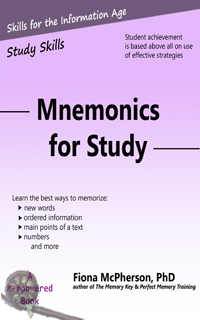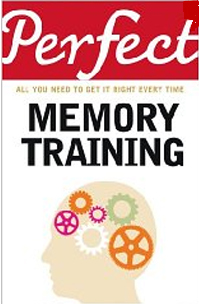
Fiona McPherson has a PhD in cognitive psychology from the University of Otago (New Zealand), and her non-fiction books are usually about memory and learning. Her first book, The Memory Key, was published by Tandem Press in 1999, and subsequently published in the United States by Career Press and in Germany by mvg Verlag. A later revision was published by Random House UK as Perfect Memory Training, and has been translated into French. Since 2000 she has maintained a website (www.mempowered.com) dedicated to providing information on memory and how to improve it. Dr McPherson has also published several books on specific memory and learning topics.
As F.M. McPherson, Fiona McPherson also writes fiction. You can find out more about her fiction at her website www.fmmcpherson.com.

Working ‘hard’ is not enough! To be an effective student, you want to work
‘smart’.
Being a successful student is far more about being a smart user of effective
strategies than about being 'smart'. In Effective Notetaking and Mnemonics for
Study, Dr McPherson showed readers many strategies for improving understanding
and memory. But these on their own can only take you so far, if you don’t know
how to cement that information into your brain for the long term.
In this new book, Dr McPherson explains the 10 principles of effective practice and revision.
Few students know how to learn effectively, which is why they waste so much time going over and over material, as they try to hammer it into their heads. But you don’t need to spend all that time, and you don’t need to endure such boredom. What you need to do is understand how to review your learning in the most optimal way. Using examples from science, math, history, foreign languages, and skill learning, that is what this book aims to teach you.
As always with the Mempowered books, this book doesn't re-hash the same tired advice that's been peddled for so long, but uses the latest cognitive and educational research to show you what to do to maximize your learning.
This book is for students who are serious about being successful in study, and teachers who want to know how best to help their students learn.

Mnemonics is one class of study strategy that is of proven effectiveness, but (like only too many effective strategies!) is used far too little. Despite many studies showing the effectiveness of mnemonic strategies, they remain the least frequently used formal memory aid used by students.
While mnemonics don't help you understand your material, they do help you remember those many details you need to achieve expertise in a topic — details such as the names of things, technical words, lists of principles.
Moreover, mnemonics can help you remember tags or labels that allow you to access clusters of meaningful information — for example, headings of a speech or main points for exam essays. For both these reasons, mnemonics are a valuable assistance to building up expertise in a subject, as well as in helping you 'cram' for an exam.
This concise book covers:
This book is the first Mempowered Visual Guide, designed to present a wide range of effective learning strategies as simply as possible. The strategies discussed in detail in Effective Notetaking, Mnemonics for Study, and How to Learn, are here presented briefly, with the critical information listed clearly and succinctly. Specific examples are given for each strategy or principle. This book can be used either as a quick reference, or as a simplified guide to the most effective learning strategies, for those who want relatively simple examples and short explanations.
This book will be available early in 2014.

Memory improvement books and courses have been around since classical times, and in today’s information-drowning environment, they are especially prevalent. But popularity is no guarantor of usefulness, and few people benefit in any lasting way from most of these books and courses.
Part of the problem is that most popular memory-improvement books and courses aim only at teaching a few strategies. But whether you habitually and appropriately use effective memory strategies - and that’s what permanent memory improvement is all about - depends on several issues, not simply knowing the strategies themselves.
You need to know something of how your memory works, to understand when each
strategy is the right one to use, and to know how to use it. And you need the
belief that will help you persist in practicing it often enough that it becomes
a habit.
That is what this book aims to teach you.

Do you have problems remembering birthdays and anniversaries, appointments and errands?
Do you sometimes find yourself in a room, and wonder why you're there?
Do you end up doing things twice because you've forgotten you've already done them?
Of all the memory failures that plague us, forgetting our intentions — birthdays, appointments, errands we mean to do — is the greatest, closely followed by those moments of absentmindedness when we lose track of what we're doing.
The special problem of these common memory failures is that they are failures that are often very obvious to others. More than any other memory failure, forgetting the future makes others feel hurt and annoyed, causing us regret and embarrassment. And absentmindedness can not simply be irritating, but dangerous.
Many people think that these sorts of problems are inevitable — a natural consequence of getting older, or going through menopause, or because of some 'natural' personality flaw. But remembering future events, and remembering what you're doing or have just done, are memory tasks that, like any other memory task, are subject to your skills. Skills can be learned.
To learn or improve a skill, you need to know effective strategies and how to practice them. This book helps you understand these memory and attention failures, and shows you how to overcome them.
As always with the Mempowered books, this fully referenced book, based on the work of cognitive researchers, helps you permanently improve your memory skills by explaining what you need to know to use these strategies effectively and appropriately.